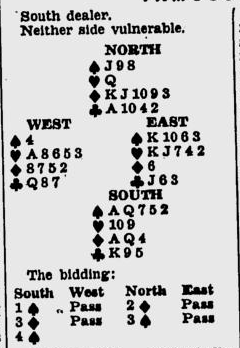The Free Lance-Star – 10 Ago 1970 by Jay Becker
The defenders learn a great deal about declarer’s hand during the bidding, and this sometimes enables them to take advantage of declarer during the play. Here is a fine example of high-class defense.

Opening lead — five of diamonds.
South got to four spades and West, who had listened attentively to the bidding, decided that East probably had a singleton or a void in diamonds. Accordingly, West chose a diamond as his opening lead.
Declarer won in dummy and recognizing that the defender’s strategy was to play for diamond ruffs, set out to draw the adverse trumps as soon as possible by leading a low trump to the ace and another one back to the jack.
It was at this point that East, Edwin Kantar of Los Angeles, made the remarkable play of permitting the jack to win!
As a result, South could no longer make the contract. Whatever he played next, he was bound to go down one. Actually, declarer led another trump from dummy. Kantar won with the king, cashed the king of hearts, continued with a heart to the ace, and West delivered the decisive blow when he returned a diamond for Kantar to ruff.
Now let’s suppose that Kantar had won the jack of spades with the king, as any other civilized human being would have done. In that case, South would have made the hand even though East returned a heart to his partners ace and got a diamond back in return. The effect of ducking the jack of spades was to permit the defense to score two heart tricks, a ruff and a spade, instead of one heart trick, a ruff and a spade. Kantar had the presence of mind to postpone his desire for a ruff.
Esta entrada también está disponible en: Spanish

